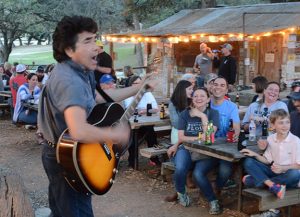
Drawing on his life experiences, Jimmy Lee Saurage has figured out how to make a living doing what he loves–playing music in the Hill Country. Photo by Phil Houseal
Mar 1, 2017–Back when we were picking under the trees at Luckenbach 40 years ago, Maggie Montgomery laughingly promised to write a book entitled How To Survive In the Hill Country With No Visible Means of Support.
Making a living solely by playing guitars was harder than working at a factory building guitars, but that didn’t keep us from trying.
That was on my mind last week when I passed through Luckenbach and caught Jimmy Lee Saurage holding forth, entertaining a Saturday night crowd with just his guitar, his wits, and decades of experience.
Here, I thought, was a guy who was actually doing it. And an unlikely one at that.
Saurage was the son of a Korean mother and an American GI. He was adopted at age 3 by “proud to be hillbillies” who brought him up in “little bitty towns” in Louisiana and Arkansas and Missouri and Texas.
Eventually, like pretty much every musician around here, he was drawn to Luckenbach. Technically, his van broke down in Luckenbach.
“I was a homeless musician living in my van, looking for gigs,” Saurage told me while sitting at a picnic table after his gig. “I heard Luckenbach was a good place to get exposure.”
In addition to car troubles, the musician had embraced the whole “sex, drugs, and rock and roll” mantra.
“All I’m saying is I lived the lifestyle,” admitted the self-described “high school goody goody.” “I wanted to know first hand what it was like, and I got strung out for awhile. I was addicted to partying.”
Saurage managed to kick his old habits cold turkey, and has been clean for years. His “high” now is performing. He is as passionate about the music business as he was about the party business. He emphasized how important it is to take care of both the “music” and the “business” sides of the music business.
“You have to hone your craft,” he said. “I have a friend who says that’s why it’s called ‘show business’–if you don’t have anything to show you got no business being on stage.”
Saurage admits he had to learn, too.
“I sucked the first 20 years I was performing live,” he said. But he studied. He listened to great musicians and learned their styles. He took acting classes. He played in bands bad and good. He enrolled in music theory at the University of North Texas. “Would you hire an amateur surgeon to do surgery? I am always amazed at the number of people who think they can throw some songs together and go out in front of an audience.”
Saurage also worked the business side. Someone told him that senior living homes paid entertainers as much as a club does. So he looked up nursing homes in the Yellow Pages, knocked on doors, and auditioned. He got the gigs.
“I had enough repertoire and showmanship that I could play for that age group,” he said. “A lot of times when I didn’t have any mainstream gigs, I played nursing homes. Now I have more than I need to pay my bills and put some money away.”
It probably helps that Saurage has another natural asset: he is a ham.
“Being in speech and drama showed me how to project and be a ham,” said the man who does a “Korean Elvis” act. “Being a karaoke host for 10 years taught me how to work a room. I learned how to not have any dead air. That’s why I talk so fast.”
During the weekends, you’ll find Saurage putting his theory into practice at restaurants, clubs, and wineries. Though he has played in many bands, including stints in Las Vegas, making a living at music now means going solo–just him and his audience.
“You make the audience part of the act. You bring them in where they have a memorable experience and be a part of the show.”
Though my questions were about How To Survive In the Hill Country With No Visible Means of Support, that’s not the main reason he plays music.
“At my age, I’m thankful to be working and not have to do some menial job,” he said. “I live for it. It’s not what I do; it’s what I am.”
As if on cue, a group of fans approached our table and a lady politely touched him on the shoulder.
“Thank you so much,” she told him. “We sure enjoyed it. I especially loved ‘I Saw The Light.’ I love that one.”
It’s not what he does; it’s what he is.
XXX
Details:
Contact Jimmy Lee Saurage at jlsaurage@hotmail.com or (830) 225-0216